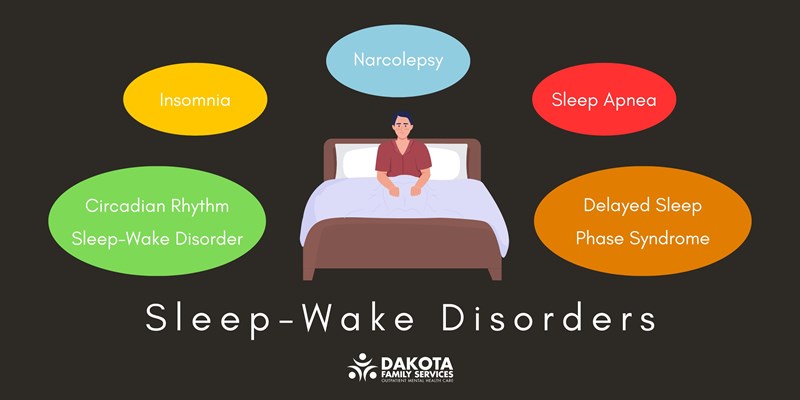Sleep-Wake Disorders
Definition
A sleep-wake disorder is a disruption of normal sleep that occurs regularly and causes distress or problems with daily life. Sleep-wake disorders range from mild conditions—such as irregular sleep habits, insomnia, and jet lag—to serious and sometimes life-threatening conditions such as sleep apnea, narcolepsy, and advanced or delayed sleep phase syndrome. Sleep-wake disorders can have serious consequences for a person's ability to function in daily life.
Sleep-wake disorders can be treated using medications, lifestyle changes, cognitive-behavioral therapy, and sleep retraining.
Related terms:
- Sleep disorders
- Sleep apnea
- Narcolepsy
- Delayed sleep phase syndrome
- Insomnia
- Circadian Rhythm Sleep-Wake Disorder
Key Things to Know About Sleep and Wake Disorders
- A sleep disorder can affect your mood, memory and learning, and your ability to wake up refreshed. It can also put you at risk for other health problems such as obesity, high blood pressure, and heart disease.
- Shifting between time zones and changing work schedules can interrupt sleep patterns for anyone, but especially those with a sleep-wake disorder
- As a person ages, hormone deficiencies, blood pressure problems, and other stressors take their toll on the body's biorhythms, affecting a person's ability to fall asleep and stay asleep.
Treatments Include
Cognitive Behavioral Therapy for Insomnia (CBTI)
CBT-I focuses on exploring the connection between the way we think, the things we do, and how we sleep. During treatment, a trained CBT-I provider helps to identify thoughts, feelings, and behaviors that are contributing to the symptoms of insomnia. Thoughts and feelings about sleep are examined and tested to see if they’re accurate, while behaviors are examined to determine if they promote sleep. A provider will then clarify or reframe misconceptions and challenges in a way that is more conducive to restful sleep. Treatment often takes from 6-8 sessions.
Cognitive Restructuring
Cognitive restructuring breaks the cycle of dysfunctional thoughts about sleep through identifying, challenging, and altering the thoughts and beliefs that contribute to insomnia. Common thoughts and beliefs that may be addressed during treatment include anxiety about past experiences of insomnia, unrealistic expectations of sleep time and quality, and worry about daytime fatigue or other consequences of missed sleep. Inaccurate thoughts are identified, challenged, and altered with the help of a trained provider who can assist in evaluating them more objectively. Homework is often assigned to allow time to practice these skills between sessions.
Sleep & Mental Health Wellness
Sufficient sleep, especially REM sleep, facilitates the brain’s processing of emotional information. During sleep, the brain works to evaluate and remember thoughts and memories, and studies show that a lack of sleep is especially harmful to the consolidation of positive emotional content. This can influence mood and emotional reactivity and is tied to mental health disorders and their severity, including the risk of suicidal ideas or behaviors
Common Misconceptions
The traditional view, which held that sleep problems were a symptom of mental health disorders, is increasingly being called into question. Instead, it is becoming clear that there is a bidirectional relationship between sleep and mental health in which sleeping problems may be both a cause and consequence of mental health problems.
More Resources:
- Insomnia: When You Just Can't Sleep (Podcast Episode)
- Getting Some Zzzzz's: The Importance of Sleep (Podcast Episode)
- Ways to Help Kids Sleep (Blog Article)


